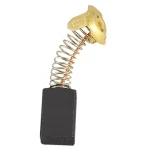INGCO S-EP-BRH-PL9001, Planner Brush Box
- Brush Shape: come in various shapes and sizes
- Brush Holder: Brushes are housed within brush holders
- Spring Mechanism
- Description
- Reviews (0)
Description
INGCO S-EP-BRH-PL9001, Planner Brush Box(S-EP-BRH-PL9001)
product details:
Carbon brushes, also known as motor brushes or commutator brushes, are electrical components found in some electric motors. They play a crucial role in transferring electrical current to the rotating part of the motor, called the rotor or armature. Here’s a detailed description of their function, key features, and where you might find them:
Function:
In a brushed DC motor or a universal motor (which can run on both AC and DC), the rotor doesn’t have a permanent magnet. Instead, it has a commutator, which is a cylindrical component made up of segmented metal contacts. The carbon brushes ride on these commutator segments and make continuous contact with them.
- Current Transfer: The brushes are connected to the motor’s positive and negative terminals, supplying current to the motor.
- Commutator Contact: As the rotor spins, the brushes make contact with different segments of the commutator.
- Current Reversal: By strategically switching the polarity of the current flow through the rotor windings (coils of wire) as the commutator segments rotate under the brushes, the motor maintains a continuous rotational direction.
Key Features:
- Material: Made from a combination of graphite and other materials like copper or abrasives. This combination ensures good electrical conductivity, friction for contact with the commutator, and some self-lubricating properties.
- Shape: The shape of the brush can vary depending on the motor application. Common shapes include rectangular blocks, round, or angled.
- Spring Contacts: Springs are used to maintain constant pressure between the brushes and the commutator for optimal current transfer.



















Reviews
There are no reviews yet.